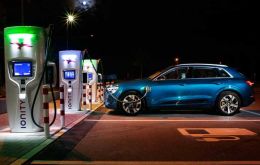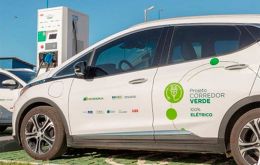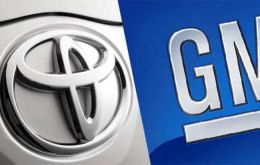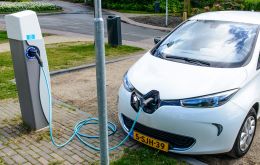MercoPress. South Atlantic News Agency
Tag: Electric car
-
Monday, April 3rd 2023 - 09:06 UTC
EU should reconsider electric cars-only plans: not enough lithium

Europe's plans to ban all fossil fuel-powered vehicles by 2035 might be thwarted by the world's lithium supply not being large enough, according to a Financial Times report published Sunday. If the European Union is to switch to electric cars, demand for lithium will skyrocket and there would not be as much supply, the article noted.
-
Monday, August 1st 2022 - 20:56 UTC
Brazilian customers have bought over 100,000 electric vehicles

The Brazilian market of battery-powered vehicles has crossed the psychologically relevant threshold of 100,000 units in circulation nationwide, as sales of this type of vehicle grew 47% yoy in the first semester of 2022, it was reported.
-
Thursday, January 6th 2022 - 07:27 UTC
GM no longer King of the Hill; Toyota tops car sales in US market for the first time

General Motors is no longer King of the Hill. Japanese carmaker Toyota led United States automobile sales for the first time in 2021 indicated Automotive News. The shift at the top of the rankings came after a year in which assembly lines were plagued by a scarcity of crucial computer chips, resulting in steep fourth-quarter sales declines for both companies.
-
Wednesday, June 30th 2021 - 00:18 UTC
Volkswagen goes electric and ends making internal combustion engines in 2035

Germany's Volkswagen will no longer make cars with internal combustion engines in Europe by 2035, a board member said. The announcement comes as carmakers in Europe face mounting pressure to combat climate change and curb emissions under new EU regulations
-
Saturday, April 24th 2021 - 07:02 UTC
Paraguay and South Korean finalize details for joint electric car parts production to start in 2022

Paraguay's Minister of Industry and Commerce (MIC) Luis Alberto Castiglioni Friday discussed with South Korean Ambassador To Asunción In Shik Woo the establishment of an Auto Parts Technology Center for electric cars in the South American country, which is due to commence in 2022 and last for about five years, it was reported.
-
Tuesday, April 20th 2021 - 10:24 UTC
Chile's SQM to supply lithium to Johnson Matthey for electric car batteries

The Chilean Chemical and Mining Society (SQM), one of the world's largest lithium producers, will supply lithium hydroxide to the British firm Johnson Matthey, at least until 2028, according to a new contract signed on Monday, it was announced.
-
Thursday, April 18th 2019 - 09:05 UTC
Toyota Brazil to build a Corolla sedan that runs on electricity, ethanol and gas

Japan’s Toyota Motor Corp said on Wednesday it will begin building a new version of the Corolla sedan in Brazil that will run on electricity, ethanol and gas, which it says will be the first vehicle of its kind in the world.
-
Thursday, February 7th 2019 - 07:44 UTC
Bank Of America: Oil Demand Growth To Hit Zero Within A Decade

By 2030, oil demand could hit a peak and then enter decline, according to a new report. For the next decade or so, oil demand should continue to grow, although at a slower and slower rate. According to Bank of America Merrill Lynch, the annual increase in global oil consumption slows dramatically in the years ahead. By 2024, demand growth halves, falling to just 0.6 million barrels per day (mb/d), down from 1.2 mb/d this year.
-
Saturday, May 5th 2018 - 09:15 UTC
When Will Electric Cars Take Over The Roads?

The age of the electric vehicle (EV) will be here sooner than you think.
